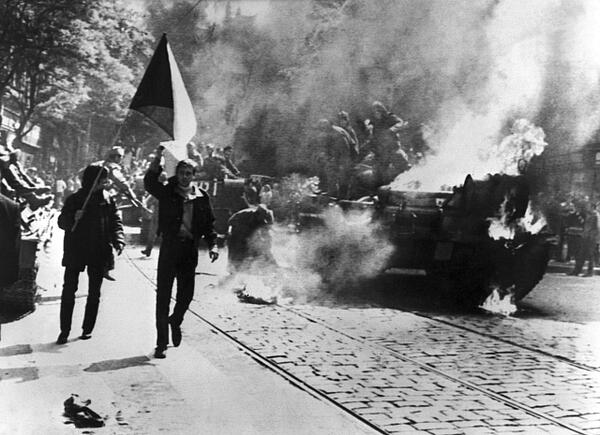The Prague Spring of 1968
The Prague Spring of 1968 was a brief period in which reforms were introduced to communist Czechoslovakia by Alexander Dubček. It was brought to an end with a Soviet invasion and the toppling of Alexander Dubček as the leader of the Communist Party in Czechoslovakia.
In Czechoslovakia, there were rumblings of dissent as early as May 1966. People complained that the Soviet Union was exploitative and quashing local autonomy. The situation was worsened by a weak economy and ineffective reforms. Workers remained in poor housing. Rural Czechoslovakia also suffered during the regime, with farmers having to follow restrictions to innovation and cultivation.
In June 1967, Antonin Novotný, the Party Leader, was openly criticised at the Writers’ Union Congress. Students demonstrated against Novotný in October 1967, so early in 1968 he was replaced by Alexander Dubček as First Secretary of the Party.
On 5 April 1968, Dubček launched a radical series of reforms, including the introduction of a more democratic political system that allowed Slovakians more personal freedom.

Dubček aimed to reduce the totalitarian aspects of the Czech Communist Party, while maintaining the authority of the party. The party members were given the right to challenge party policy “according to their conscience” - a step aimed at reducing the totalitarian nature of the party. The Dubcek government also ended censorship in early 1968, and the acquisition of this freedom resulted in a public expression of broad-based support for reform and a public sphere in which government and party policies could be debated openly. Farmers were also given the right to form independent co-operatives, giving them greater independence.
The new reform programme also included the creation of works councils in industry and increased rights for trade unions to bargain.
But as conflicts broke out within the party over the liberalisation process, Dubcek struggled to maintain control. On the night of 20 August, troops from the Warsaw Pact invaded Czechoslovakia in an attempt to reassert Moscow’s authority. The majority of the soldiers came from the Soviet Union, but a token number of contingents from Poland, East Germany, Hungary and Bulgaria were also included to give the impression that the invasion was carried out on behalf of the whole Warsaw Pact.
The Czech military could not oppose such a great force, and, in contrast to the 1956 Hungarian Uprising, and the invasion was all but bloodless.
Dubček’s reforms were shelved and he was arrested and taken to Moscow on a Soviet military transport aircraft. Dubček returned to his position as the First Secretary of the Party and announced the end of his reforms.
But Dubček was forced to resign as First Secretary in April 1969, following the Czechoslovak Hockey Riots. He was re-elected to the Federal Assembly and became its Speaker.
In 1970, he was expelled from the Communist party and lost his seats in the Slovak parliament and the Federal Assembly.
After the invasion, Czechoslovakia entered a period of normalisation while subsequent leaders tried to restore political and economic values that had prevailed before Dubček took control of the party. His successor, Gustáv Husák, reversed almost all of Dubček's reforms.
MLA Citation/Reference
"The Prague Spring of 1968". HistoryLearning.com. 2026. Web.
